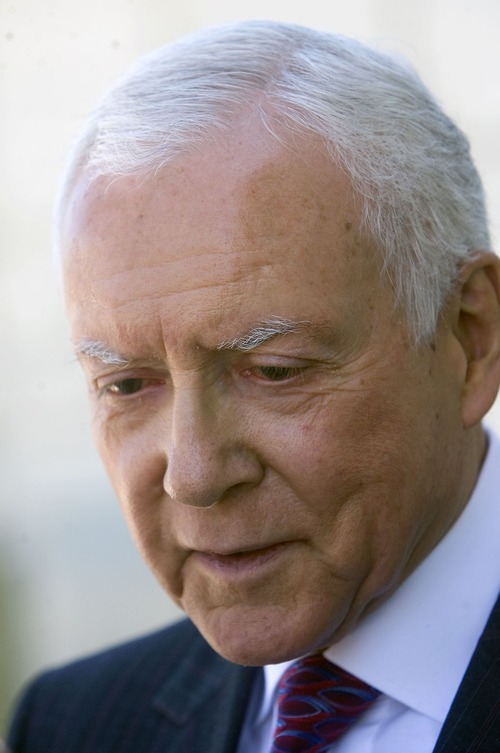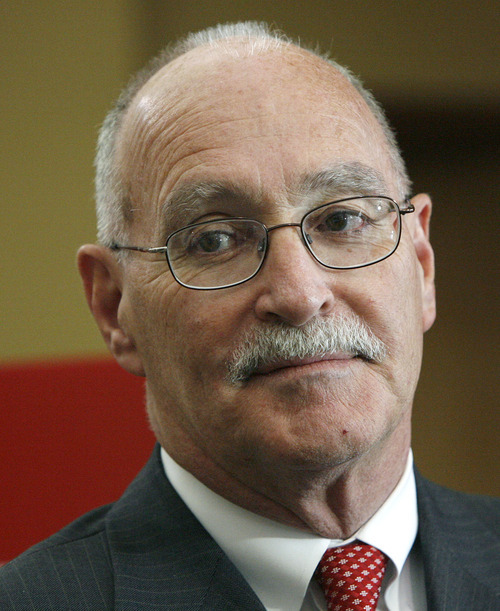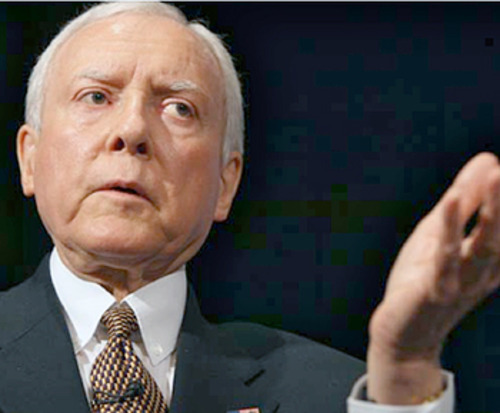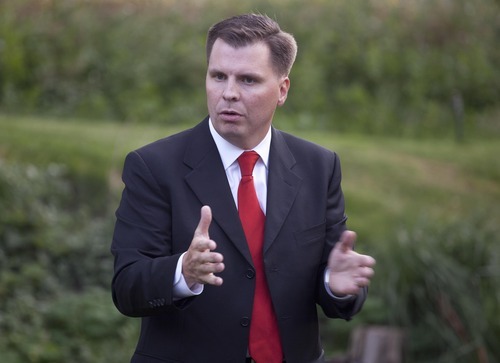This is an archived article that was published on sltrib.com in 2012, and information in the article may be outdated. It is provided only for personal research purposes and may not be reprinted.
Washington • The people behind Freedom Path don't want you to know who they are or who's giving them money. What they want is for you to re-elect Sen. Orrin Hatch.
This shadowy group, funded by secret donors, has produced a series of ads that either promote the senator or attack his Republican rivals.
Hatch says he knows little about Freedom Path and has nothing to do with it, but a Salt Lake Tribune investigation has uncovered strong ties between this organization and the senator.
Freedom Path is loaded with former employees of the National Republican Senatorial Committee, the campaign arm of sitting GOP senators. And these employees worked at the NRSC when Hatch was named the vice chairman in 2008.
Mike and Lindsey Slanker, of Las Vegas, were among them. Mike Slanker now makes Freedom Path's ads, while at the same time owning a company providing online assistance to Hatch's campaign. And his wife, Lindsey, is a paid fundraiser for the senator.
These links illustrate the new world of campaign finance, where court rulings have allowed outside groups to raise and spend unlimited money but only if they keep the candidate at arm's length.
Super political action committees, many with similar ties to the politicians they support, have dominated the presidential race, often spending more on advertising than the candidates themselves.
Freedom Path isn't exactly a super PAC. It's a tax-exempt nonprofit. This legal distinction means the group never has to identify its contributors no matter how much the companies and individuals give.
Former state Sen. Dan Liljenquist, one of Hatch's opponents, has been Freedom Path's primary target. He isn't calling for the group to get out of the race, but he does want to know who's behind the attacks.
"I think organizations have just as much right as people to participate in politics, but there should be visibility on who is funding them and where that money is coming from," said Liljenquist.
Government watchdogs, such as Fred Wertheimer, take a stronger stance.
"The most dangerous money in American politics is unlimited contributions and/or secret money, because they are vehicles for buying influence over government decisions," said Wertheimer, president of Democracy 21, a group advocating for stricter campaign finance controls. "The money they are using to finance campaign expenditures needs to be disclosed in order to defend against corruption."
Freedom Path isn't the only outside group weighing in on Utah's Senate race or the only one shielding its donors from the public. The American Action Network, a prominent national GOP group led by former Sen. Norm Coleman, also produced an ad slamming Liljenquist, while the tea party-fueled FreedomWorks has been running a Retire Hatch campaign for months.
But the pro-Hatch Freedom Path is the only one that has gone to considerable lengths to preserve the anonymity of its employees, board of directors and donors.
—
Anonymous • Finding any information on Freedom Path is difficult. The group has a Salt Lake City address, but it's a virtual office shared by a number of companies. Phone calls go directly to a generic voice mail. Its website includes no names.
As a nonprofit, it legally must have a board of directors, identified on publicly available documents. But in reaction to a Tribune records request, the IRS says it has "no record of tax-exempt status." That could mean Freedom Path hasn't filed yet, has sought an extension or the IRS has questions about its application. The IRS has started to review such applications more closely, causing some groups to complain that the probes are politically motivated. (See story on A15.)
The only known person directly associated with Freedom Path is J. Scott Bensing, a Nevada lobbyist whose name appears on the group's scant filings with the Federal Election Commission.
Bensing said he incorporated the group in January 2011 and its IRS filing is pending. He said he's a member of the board but refused to divulge any other participants.
"The other board members are Utahns and value their privacy," he said.
Beyond Freedom Path, Bensing appeared to have two lobbying clients — the Nevada Department of Transportation and Zuffa Inc., parent company for the Ultimate Fighting Championship. Zuffa is a major Hatch supporter, with its executives and affiliated employees contributing $58,000 to the senator's re-election effort.
The group has lobbied Congress to fight online piracy, and Hatch has been a leader on that issue.
Bensing has also contributed to Hatch's campaign, writing a $1,000 check last November.
He said his donation was not Zuffa-related and he would not say whether his clients have also given to Freedom Path, only reiterating that all of its donors will remain anonymous. A Zuffa spokesman said the corporation hasn't given money to Freedom Path, but he couldn't speak for the executives or affiliated companies like the Station Casinos.
—
November Inc. • The Freedom Path staff, including Bensing, Mike Slanker and its two lawyers, all worked together at the National Republican Senatorial Committee when former Nevada Sen. John Ensign led the group and Hatch was his second in command.
Bensing and Slanker were among Ensign's closest advisers, and they are partners in a full-service political consulting firm, November Inc.
Their company became embroiled in a sex scandal that led to Ensign's resignation last year. Ensign had an affair with a married campaign staffer whose husband worked on his Senate staff. The senator helped that man get a job at November Inc.
The company remains a force in Nevada politics, representing Sen. Dean Heller, who replaced Ensign, while also providing services to the NRSC and Hatch's campaign.
Dave Hansen, Hatch's campaign manager, said Bensing and Mike Slanker have never directly worked for the senator, but Hansen did meet with Slanker in January 2011 to explore such an arrangement.
"There was some discussion about whether Mike would be involved," Hansen said. "He said, 'I have some other things to do,' and he didn't exactly specify."
That same month Bensing created Freedom Path, though the group's first ad, which supported the senator's efforts on a balanced budget amendment, didn't appear on Utah televisions until July.
Hansen said it was only after that first ad that he learned Slanker and Bensing had started a pro-Hatch group.
"I know in some things it is better not to ask a lot of questions because you don't want to know some of the stuff that is happening," he said.
But Hansen did talk to his lawyer and checked on the legality of continuing to employ the Slankers' companies on the campaign.
Lindsey Slanker runs a fundraising operation under the name October Inc., receiving $37,000 in payments from the Hatch campaign in 2011. And Mike Slanker owns Autumn E-Media, which the Hatch campaign paid $34,000 in the past year for website support.
These three companies are intertwined, sharing logos, P.O. boxes, phone numbers and email addresses. November Inc.'s website refers to Autumn as "an in-house team to assist online and Web-based campaigns," while October Inc.'s mission statement says it has experience creating political nonprofits.
—
The firewall • Slanker's connections to both Freedom Path and Hatch's campaign are most likely legal, according to Matt Sanderson, a campaign-finance attorney based in Washington, D.C.
He noted that other outside groups share vendors with candidates, and the Federal Election Commission has said that is fine as long as there are separate employees working on the accounts and those employees don't discuss their work with each other.
"The FEC would start from the presumption that they are separate," said Sanderson.
Bensing said November Inc. is aware of the law and follows a strict "firewall policy" when it serves clients that could get into trouble for coordinating.
Freedom Path also must follow rules on how it spends its money. Nonprofits can use only half of their cash on ads supporting or opposing a candidate. Most of it must be spent advocating for a political issue.
In practicality, all of Freedom Path's money so far has been spent supporting Hatch. Its issue-advocacy ads have supported a balanced budget amendment and opposed health reform, while at the same time touting Hatch's role in these efforts.
The political ads have attacked Senate challengers Liljenquist and Chris Herrod largely on two state legislative issues — government transparency and public employees earning a pension while staying on the job.
The group has filed only one FEC report, for its latest ad against Liljenquist, which cost $130,000. Bensing said the group has spent $160,000 on an ad criticizing the new health-reform law. Freedom Path has not filed any information on the money spent on fliers mailed to the homes of likely Republican caucus attendees or Web advertisements.
—
Outside groups • Hansen said he likes Freedom Path's ads, while the senator wished they would get out of his race.
But Hatch would not ask Freedom Path to stop its activities as long as other outside groups are busy trying to influence voters.
"I have nothing to do with any outside group and frankly wish they were all out of there," he said. "I'd just as soon have them all out of there and let us run our own campaign."
Hatch said he had "some ideas" who was behind the group but wasn't positive, and he said he has not asked people to give money to Freedom Path or any other outside group.
Hansen said it made no sense for pro-Hatch groups to stand down, while FreedomWorks, the tea-party organization, has spent more than $571,000 so far questioning the senator's conservative credentials, including a TV ad now running that links the senator to the national debt.
"I'd be more than happy, if FreedomWorks would get the hell out of this race, for every other group to do the same thing," Hansen said.
But FreedomWorks argues that its activities are far different from those of Freedom Path.
"FreedomWorks has been around since 1984. We are going to be around for years in the future," said Russ Walker, who runs the group's super PAC. "Freedom Path is set up for one purpose, and that is to get Orrin Hatch re-elected."
He argued Bensing and Slanker created a group to "confuse voters," picking a name that was close to FreedomWorks.
"Their effort is definitely to obscure who they are and to make people think they are different than they are," he said.
Bensing denies that.
"The name was not meant to confuse," he said, "nor are we looking to slight FreedomWorks. I'm not out to pick fights with them or do things that are counterproductive to what they want to do."
Hansen noted that FreedomWorks also has a nonprofit parent group that can shift money from undisclosed donors to its super PAC, which it has done repeatedly as it fights Hatch through the mail, online and over the airwaves.
Well-funded outside groups like FreedomWorks, American Action Network and Freedom Path are likely to ramp up efforts in the weeks to come.
Republicans gather Thursday to select delegates to the state party convention, which will take place in late April. Those delegates have the power to select the party nominee, but only if 60 percent of them back one candidate. If not, the top two would face off in a June primary.
Twitter: @mattcanham —
Outside spending
Political organizations are spending big to persuade Utah voters to either re-elect Sen. Orrin Hatch or give an upstart Republican a chance to take his spot in Washington.
Here are the groups and how much they have spent so far:
FreedomWorks
Purpose • Opposes Hatch
Amount • $571,000
Purchased • TV and radio ad, mailings, polls
Freedom Path
Purpose • Supports Hatch
Amount • $280,000
Purchased • TV ads, mailings
National Rifle Association PAC
Purpose • Supports Hatch
Amount • $13,500
Purchased • Mailer
American College of Radiology PAC
Purpose • Supports Hatch
Amount • $77,000
Purchased • Mailers
Source: Federal Election Commission









